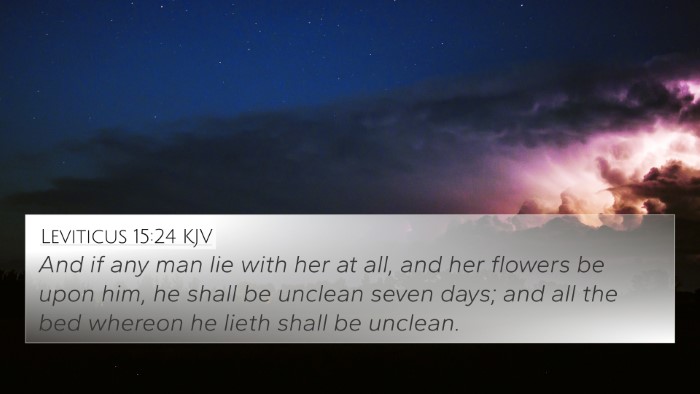Understanding Leviticus 15:33
Leviticus 15:33 states: "And of her that is sick of her flowers, and of him that hath an issue of seed, and of her that is sick, and of him that hath an issue of seed; they shall be unclean." This verse details the ceremonial laws regarding cleanliness during bodily discharges, highlighting the importance of purity in the Israelite community.
Summary and Interpretation
This verse articulates specific regulations regarding the state of ceremonial uncleanness for certain ailments, particularly related to bodily fluids. The underlying theme focuses on the concept of purity, both physical and spiritual, as a means to maintain holiness before God.
Commentary Insights
Matthew Henry's Commentary
Matthew Henry emphasizes the significance of understanding the nature of ceremonial law. He notes that these regulations served as a reminder to the Israelites of their covenant relationship with God. The diseases and discharges mentioned are not viewed as inherently sinful but serve as symbols of moral and spiritual uncleanness. The laws help reinforce the community’s commitment to observing God's commandments and maintaining holiness.
Albert Barnes' Commentary
Albert Barnes elaborates on the physiological aspects related to the laws of bodily discharges. He highlights how these regulations were intended to foster a sense of awareness and care regarding one's health and spiritual status. Barnes believes that the laws of cleanliness point towards the greater reality of being spiritually pure before God, which is an essential theme throughout the Scriptures.
Adam Clarke's Commentary
Adam Clarke discusses the broader implications of these cleanliness laws within the Israelite community. Clarke notes the way these laws reflect God's desire for His people to approach Him with reverence and purity. He suggests that the repeated emphasis on cleanliness serves to inhibit moral decay, encouraging the Israelites to pursue a lifestyle reflective of holiness.
Bible Verse Cross-References
This verse can be connected thematically and contextually to several related verses that explore issues of purity and uncleanness:
- Leviticus 11:44-45 - Addresses the necessity of holiness among God’s people.
- Hebrews 12:14 - Speaks to pursuing peace and holiness to see the Lord.
- Numbers 19:11-13 - Discusses the consequences of contact with the dead regarding cleanliness.
- Ephesians 5:26 - Illustrates purification through the word, linking physical and spiritual cleanliness.
- 1 Peter 1:16 - Echoes the call to be holy, as God is holy.
- 2 Corinthians 7:1 - Advises believers to cleanse themselves from all filthiness of the flesh and spirit.
- Isaiah 52:11 - Calls for God's people to depart from unclean things.
Thematic Bible Verse Connections
The connections between Leviticus 15:33 and other scriptures illustrate the Bible's comprehensive call to holiness and cleanliness. Not only do these passages link the physical state of being clean with spiritual purity, but they also foster an understanding of how one’s approach to God must involve a recognition of His holiness.
Cross-Referencing Biblical Texts
When engaging in Bible cross-reference, it’s crucial to consider how each verse contributes to the broader narrative of Scripture. The themes of purity, cleanliness, and holiness permeate the entirety of the biblical text:
- The Old Testament Law provides a foundation for understanding Christ’s redemptive work.
- The New Testament emphasizes the fulfillment of the Law through Jesus, reinforcing the call to internal purity.
Conclusion
Leviticus 15:33 serves as an important note in the overall discussion of purity in the Bible. Through a careful study of cross-references and thematic connections, one can appreciate the depth of meaning behind the ceremonially unclean laws and their relevance both historically and in modern Christian life.
By utilizing tools for Bible cross-referencing such as concordances and study guides, believers can uncover rich insights and teachings that connect various parts of Scripture, aiding in a deeper understanding of God's word.





